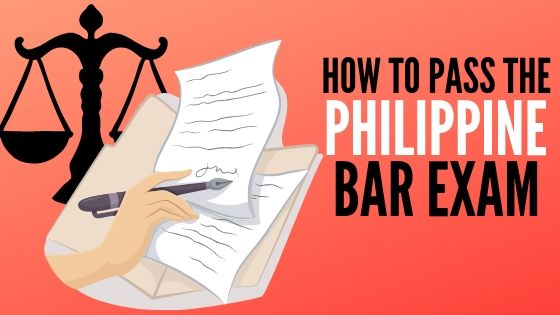How To Pass the Bar Exam in the Philippines: Tips From a Filipino Lawyer

Taking the Bar Exams? In this guide, a Filipino lawyer summarizes the preparations and study tips you need to know to ace the Philippine Bar Examinations.
READ: How to Become a Lawyer in the Philippines: A Definitive Guide
Do I Need To Enroll in a Review School for the Bar Examinations?
It is not required but most recommended.
Although certainly self-study and a dedicated study schedule are still the most important things for the Bar Exams, there is no doubt that review schools will help you streamline your study.
Some review schools even offer mock Bar Examinations that not only aid you in the proper way of answering questions but also gauge your handwriting and test your legal knowledge. Some review teachers even provide ‘Bar tips’ or questions most likely to appear in the Bar Examinations.
How To Pass Bar Exam: 10 Preparation Tips You Need To Know
1. Have a Study Plan
Five or six months before the Bar Exams, do a study plan. Set dates that are not too strict nor too loose. Have your study materials, pens, highlighters, Manila papers, and markers ready.
2. Study the Basics
You will never go wrong by studying the basics. No matter how complicated the question, the basics are always there to help you out.
3. As a rule, do not read new textbooks
Stick to the textbooks and reviewers that you have already read in law school.
4. Discriminate teachers in review school
You do not have to attend the review class every day. Decide for yourself whether it is better to study alone or go to class. Assess how weak you are with the subject, the qualification of the professor teaching the class, and the contents of the class itself.
5. Stick to case digests
Throw the debate whether to read cases in full or go with case digests. In review, you simply do not have the time to read the cases in its full text. Go with digests.
6. Practice answering previous Bar questions
Like any exam, questions in the Bar Examinations sometimes get repeated. Read the previous Bar Exams. Compare and contrast what kind of questions always come up. You may use this set of books called “Pareto Notes” that already does this for you.
7. Have a study buddy
It is ill-advised to form study groups as each of you might have different schedules and study habits. It is, however, recommended to have a study buddy that you can bounce questions or throw Bar tips with.
8. Study every day but take a lot of breaks
It is recommended to study every day – Saturdays, Sundays and holidays included. Do not, however, burnout. Take many breaks throughout the day. Manage your time so you can still watch Netflix, browse Facebook, or have dinner with a friend.
9. Do a second reading
Schedule the second reading of your study materials to really reinforce the materials in your mind.
10. Take advantage of your school’s Bar Operations
They are there to help you out. Ask if they have notes available. Do not forget to thank them for their volunteer work.
I Took the Bar Exams. What Do I Do Now?
Well, now you have to wait for the results.
It takes about six months (from November to May) for the examiners to check the booklets, for the Supreme Court to encode the scores, and for the Justices to have a session en banc (as the entire group) and release the results.
In the meantime, you may take a long-needed rest, or if you are itching to work, apply as an underbar associate to law firms or as a legal assistant to government agencies.
What if I Fail the Bar Exams?
Grieve, and take it once again. There is no maximum number of tries in taking the Bar Exams.
Take note, however, that candidates who have failed the exams thrice shall be disqualified from taking another examination unless they enroll in and pass regular fourth-year review class as well as attend a pre-bar review course in a recognized law school.
Go back to the main article: How to Become a Lawyer in the Philippines: A Definitive Guide
Written by Atty. Rhyne Token
Atty. Rhyne Token
He is a graduate of San Beda University - College of Law and presently working as an Attorney for the Legal Division of the National Privacy Commission. Part of his advocacy is to promote good mental health ethics in the workplace.
Copyright Notice
All materials contained on this site are protected by the Republic of the Philippines copyright law and may not be reproduced, distributed, transmitted, displayed, published, or broadcast without the prior written permission of filipiknow.net or in the case of third party materials, the owner of that content. You may not alter or remove any trademark, copyright, or other notice from copies of the content. Be warned that we have already reported and helped terminate several websites and YouTube channels for blatantly stealing our content. If you wish to use filipiknow.net content for commercial purposes, such as for content syndication, etc., please contact us at legal(at)filipiknow(dot)net